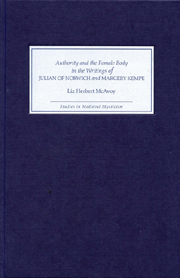Book contents
- Frontmatter
- Contents
- Dedication
- Acknowledgements
- Abbreviations
- Introduction
- 1 Motherhood and Margery Kempe
- 2 The Motherhood Matrix in the Writing of Julian of Norwich
- 3 Discourses of Prostitution and The Book of Margery Kempe
- 4 ‘3yf thowe be payede,’ quod oure lorde, ‘I am payede’: Hermeneutics of the Holy Whore in Julian of Norwich
- 5 Margery Kempe: Wisdom, Authority and the Female Utterance
- 6 Julian of Norwich: Voice of the Wise Woman
- Afterword
- Bibliography
- Index
4 - ‘3yf thowe be payede,’ quod oure lorde, ‘I am payede’: Hermeneutics of the Holy Whore in Julian of Norwich
Published online by Cambridge University Press: 12 September 2012
- Frontmatter
- Contents
- Dedication
- Acknowledgements
- Abbreviations
- Introduction
- 1 Motherhood and Margery Kempe
- 2 The Motherhood Matrix in the Writing of Julian of Norwich
- 3 Discourses of Prostitution and The Book of Margery Kempe
- 4 ‘3yf thowe be payede,’ quod oure lorde, ‘I am payede’: Hermeneutics of the Holy Whore in Julian of Norwich
- 5 Margery Kempe: Wisdom, Authority and the Female Utterance
- 6 Julian of Norwich: Voice of the Wise Woman
- Afterword
- Bibliography
- Index
Summary
Julian of Norwich's negotiation of contemporary sexual attitudes towards women is an aspect of her writing which has been largely overlooked, in spite of the fact that so much has been written about her perception of God as specifically maternal. One possible reason for this oversight is that her status as an anchoress (and, by implication an a-sexual or desexualised religious) has acted as a modern-day screen to such investigations. Or, perhaps, the now largely rejected theory that she was a nun at Carrow prior to enclosure has also been thoroughly internalised by modern commentators, leading them to treat her writing as a wholly disembodied corpus. Indeed, a consistent focus upon Julian's re-envisioning of God as mother has had the effect of dominating or even obscuring alternative discourses and hermeneutics of the female body in her writing. This chapter, therefore, will attempt to address this absence by investigating the extent to which the concept of a sexualised female body, in its capacity as commodity to be used, bestowed and/or traded with, is utilised by Julian as a means of explicating her vision of God's divine covenant with humankind. In so doing, it will also attempt to address the question of whether Julian's writing demonstrates an internalisation of contemporary attitudes towards the female body, or if her ubiquitous use of it as a referent reveals a subtle rechannelling of such attitudes into a means of contemporising and expressing her perception of God's love for humanity.
- Type
- Chapter
- Information
- Authority and the Female Body in the Writings of Julian of Norwich and Margery Kempe , pp. 131 - 169Publisher: Boydell & BrewerPrint publication year: 2004



